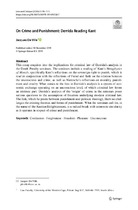| dc.description.abstract | This essay enquires into the implications for criminal law of Derrida’s analysis in
the Death Penalty seminars. The seminars include a reading of Kant’s Metaphysics
of Morals, specifcally Kant’s refections on the sovereign right to punish, which is
read in conjunction with the refections of Freud and Reik on the relation between
the unconscious and crime, as well as Nietzsche’s refections on morality, punishment and cruelty. What comes to the fore in Derrida’s analysis is a system of economic exchange operating on an unconscious level, of which criminal law forms
an intrinsic part. Derrida’s analysis of the ‘origin’ of crime in the seminars poses
serious questions to the assumption of freedom underlying modern criminal law.
The link, which he posits between punishment and political theology, likewise challenges the existing theories and forms of punishment. What the seminars call for, in
the name of the Kantian Enlightenment, is a radical break with economic circularity
as it operates in respect of crime and punishment. | en_US |

